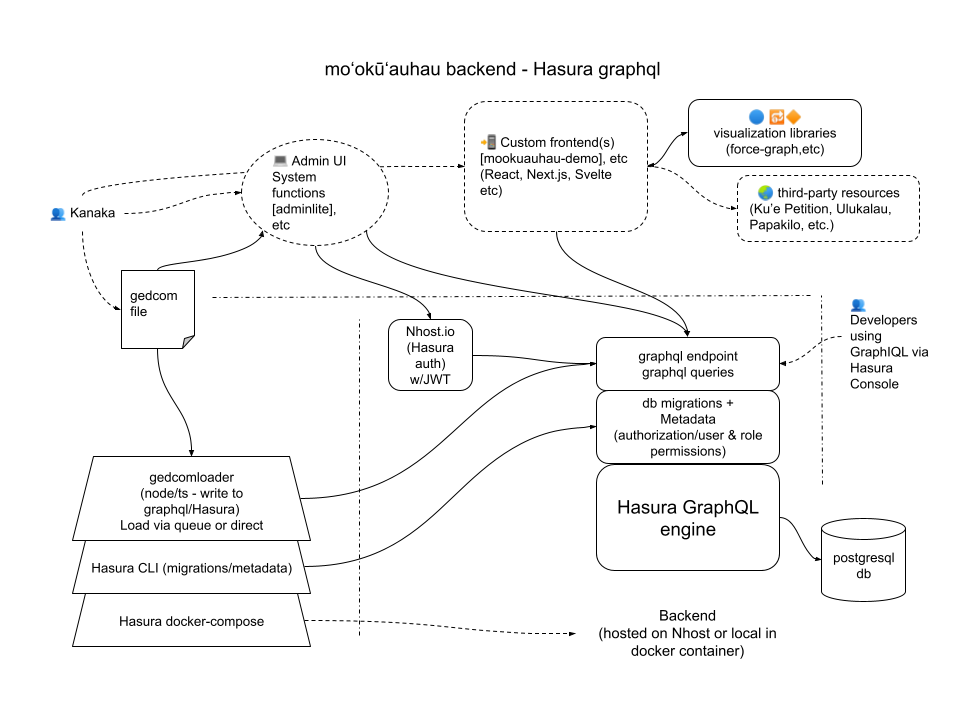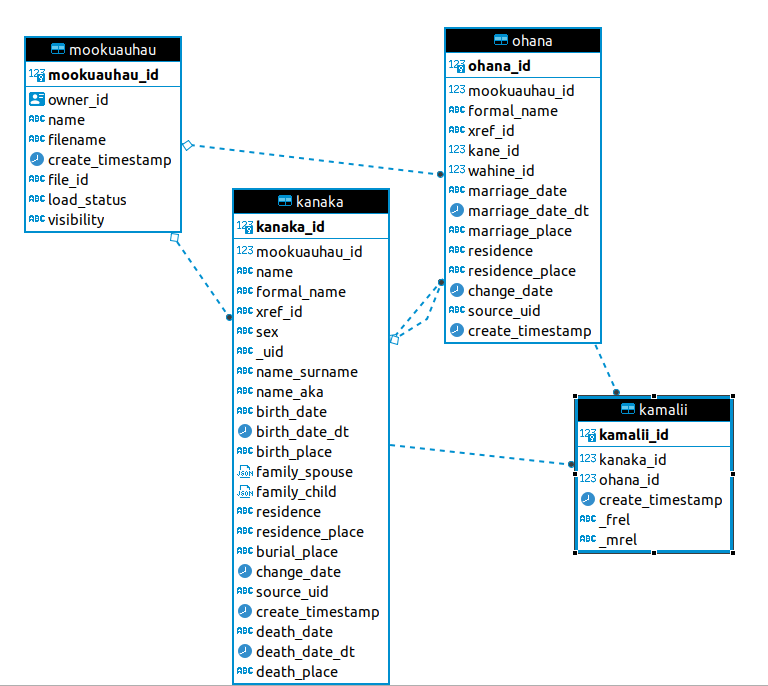Backend code repository for the Moʻokūʻauhau project
- Hasura setup w/PostgreSQL migrations
- GEDCOM file loader (command line)
- optional JWT auth connected to mookuauhau.owner_id (developing first using Nhost.io Hasura Auth)
The kuleana for the mookuauhau-backend project repository is:
- Provide a data store for genealogy data
- Make the data available via a GraphQL API for various frontend visualization UI/UX
- Load GEDCOM file(s) into the data store
- Allow for future security permissions integrations
- Allow for possible private instances, or also multi-tenant dataset in the same database.
We have a core implementation available for use in the Hawaiians in Tech 2022 Hackathon, but which could be a base for future work.
Backend tech stack:
- Hasura GraphQL engine
- PostgreSQL relational db
- NodeJS TypeScript GEDCOM file loader via graphql api
These may be run against either local instances running in Docker containers, or else run against hosted instances ( Hasura Cloud, Nhost.io, etc. )
Alternatively, Neo4j can be used as an alternative backend, for schemaless graph database. It has more built-in data visualization tools, but is more reliant on the Cypher query language.
npm run load ../gedcom/mookuauhau.ged
When the 'load' script is run:
- runs the 'parse-gedcom' parse() on it to AST object
- sends the AST object to a transform() function to map to genealogy objects
- objects process to the configured 'mutations' adapter: 'graphql', 'neo4j', or 'mock'.
- creates mookuauhau, kanaka, ohana, kamalii records from the objects.
npm run queueload
Note: queue load requires Nhost backend, and the file is uploaded using the demo-mookuauhau-adminlite web app.
- The user registers/logs into the admin ui,
- uploads a GEDCOM file (stored on Nhost storage)
- a 'mookuauhau' record is created, with owner_id set to the Nhost user_id, with load_status == 'new'
When the 'queueload' script is run:
- reads the next mookuauhau record w/load_status == 'new'
- updates mookuauhau.load_status = 'loading'
- downloads the corresponding GEDCOM file from Nhost storage
- runs the 'parse-gedcom' parse() on it to AST object
- sends the AST object to a transform() function to map to genealogy objects
- objects process to the configured 'mutations' adapter: 'graphql', 'neo4j', or 'mock'.
- creates kanaka, ohana, kamalii records from the objects.
- updates mookuauhau.load_status = 'done'
MUTATION_MODE=graphql
HASURA_GRAPHQL_ENDPOINT=https://something/v1/graphql
HASURA_GRAPHQL_ADMIN_SECRET=notmysecret
# for nhost.io auth+storage features
NHOST_BACKEND_URL=https://something
NHOST_ADMIN_SECRET=notmysecret
- main query is an individual person
- makuahine means this kanaka is a mother in an ʻohana relationship
- makuakane means this kanaka is a father in an ʻohana relationship
- nakamalii is a list of children of this kanaka (ʻohana relationship)
- namakua is a list of makua/parents this kanaka is a child of (other ʻohana relationships)
query kanakaByXrefidRelations($xref_id: String!) {
kanaka(where: {xref_id: {_eq: $xref_id}}) {
kanaka_id
name
sex
residence
xref_id
mookuauhau_id
namakua {
ohana {
ohana_id
xref_id
kane_id
wahine_id
kane {
kanaka_id
xref_id
name
}
wahine {
kanaka_id
xref_id
name
}
residence
residence_place
}
}
makuakane {
ohana_id
xref_id
kane_id
wahine {
kanaka_id
name
xref_id
}
nakamalii {
kamalii_id
ohana {
ohana_id
xref_id
}
kanaka {
kanaka_id
name
xref_id
sex
}
}
}
makuahine {
ohana_id
xref_id
wahine_id
kane {
kanaka_id
name
xref_id
}
nakamalii {
kamalii_id
kanaka {
kanaka_id
name
xref_id
sex
}
}
}
birth_date
birth_date_dt
birth_place
death_date
death_date_dt
death_place
burial_place
formal_name
name_aka
name_surname
residence_place
source_uid
}
}
parameters:
{"xref_id": "@I247@"}
result:
{
"data": {
"kanaka": [
{
"kanaka_id": 347,
"name": "Mary Punapanawea /Adams/",
"sex": "F",
"residence": null,
"birth_date": "28 Feb 1838",
"birth_place": "Niu Hawaii",
"xref_id": "@I247@",
"mookuauhau_id": 101,
"namakua": [
{
"ohana": {
"ohana_id": 307,
"xref_id": "@F207@",
"kane_id": 328,
"wahine_id": 342,
"kane": {
"kanaka_id": 328,
"xref_id": "@I228@",
"name": "Alexander /Adams/"
},
"wahine": {
"kanaka_id": 342,
"xref_id": "@I242@",
"name": "Sarah Ulukaihonua /Harbottle/"
}
}
}
],
"makuakane": [],
"makuahine": [
{
"ohana_id": 318,
"xref_id": "@F218@",
"wahine_id": 347,
"kane": {
"kanaka_id": 340,
"name": "William /Auld/",
"xref_id": "@I240@"
},
"nakamalii": []
},
{
"ohana_id": 320,
"xref_id": "@F220@",
"wahine_id": 347,
"kane": {
"kanaka_id": 459,
"name": "Edwin Harbottle /Boyd/",
"xref_id": "@I359@"
},
"nakamalii": [
{
"kamalii_id": 502,
"kanaka": {
"kanaka_id": 350,
"name": "Mary Euphrozine Hio /Boyd/",
"xref_id": "@I250@",
"sex": "F"
}
},
{
"kamalii_id": 503,
"kanaka": {
"kanaka_id": 503,
"name": "James Aalapuna Harbottle /Boyd/",
"xref_id": "@I403@",
"sex": "M"
}
},
{
"kamalii_id": 504,
"kanaka": {
"kanaka_id": 464,
"name": "Edward Strehz /Boyd/",
"xref_id": "@I364@",
"sex": "M"
}
},
{
"kamalii_id": 505,
"kanaka": {
"kanaka_id": 380,
"name": "Harriet /Boyd/",
"xref_id": "@I280@",
"sex": "F"
}
},
{
"kamalii_id": 506,
"kanaka": {
"kanaka_id": 378,
"name": "Robert Napunako /Boyd/",
"xref_id": "@I278@",
"sex": "M"
}
},
{
"kamalii_id": 507,
"kanaka": {
"kanaka_id": 382,
"name": "Caroline Hawea /Boyd/",
"xref_id": "@I282@",
"sex": "F"
}
},
{
"kamalii_id": 508,
"kanaka": {
"kanaka_id": 427,
"name": "Charlotte Kealoha /Boyd/",
"xref_id": "@I327@",
"sex": "F"
}
},
{
"kamalii_id": 509,
"kanaka": {
"kanaka_id": 344,
"name": "Sarah Kaleimoku /Boyd/",
"xref_id": "@I244@",
"sex": "F"
}
}
]
}
]
}
]
}
}
query kanakaSpecificBirthplace($mookuauhau_id: Int!, $birth_place:String!) {
kanaka(where: {mookuauhau_id: {_eq: $mookuauhau_id}, birth_place: {_eq: $birth_place}}) {
kanaka_id
name
sex
residence
xref_id
mookuauhau_id
namakua {
kanaka {
name
xref_id
sex
}
}
makuakane {
ohana_id
xref_id
kane_id
wahine {
kanaka_id
name
xref_id
}
nakamalii {
kamalii_id
kanaka {
kanaka_id
name
xref_id
sex
}
}
}
makuahine {
ohana_id
xref_id
wahine_id
kane {
kanaka_id
name
xref_id
}
nakamalii {
kamalii_id
kanaka {
kanaka_id
name
xref_id
sex
}
}
}
birth_date
birth_date_dt
birth_place
death_date
death_date_dt
death_place
burial_place
}
}
parameters:
{"mookuauhau_id": 101, "birth_place": "the Ololo Genealogy"}
query m_summary {
mookuauhau_aggregate {
aggregate {
count
}
}
ohana_aggregate {
aggregate {
count
}
}
kanaka_aggregate {
aggregate {
count
}
}
kamalii_aggregate {
aggregate {
count
}
}
}
To use a hosted Hasura backend plus auth and storage, you can use the free 'Starter' level at Nhost.io.
Once you create it, you can access the Hasura instance via endpoint URL and admin secret.
https://hasura.io/docs/latest/graphql/core/deployment/deployment-guides/docker/
quickstart:
cd ./hasura-docker
{edit .env}
{edit docker-compose.yml}
docker-compose up -d
docker ps
Then you can connect to localhost:port for the Hasura endpoint as well as the postgresql you configured.
defaults on local Docker:
- graphql endpoint: http://localhost:8021/v1/graphql
- Hasura Console: http://localhost:8021
- PostgreSQL connection: postgres://postgres:postgrespassword@localhost:5441/
The .env under ./hasura-docker can look like this:
HASURA_GRAPHQL_METADATA_DATABASE_URL=postgres://postgres:postgrespassword@postgres:5432/postgres
PG_DATABASE_URL=postgres://postgres:postgrespassword@postgres:5432/postgres
HASURA_GRAPHQL_ADMIN_SECRET=gottokeepasecret
JWT_SECRET_KEY=sharedsecretwithyourauthenticationprovider
HASURA_GRAPHQL_JWT_SECRET='{"type":"HS256", "key": "sharedsecretwithyourauthenticationprovider"}'
This command will deploy to your local docker swarm stack, and process the .env file to the compose yml.
I started using Docker Swarm locally bc my postgresql containers were stomping over each other 🤷
cd ./hasura-docker
docker stack deploy -c <(docker-compose config) mooku
docker service ls
Reference: Hasura Migrations & Metadata (CI/CD)
creating new database schema, by applying all migrations
cd ./hasura
hasura migrate --endpoint https://your.hasura.endpoint --admin-secret yoursecret --database-name default status
hasura migrate --endpoint https://your.hasura.endpoint --admin-secret yoursecret --database-name default apply
apply only 2 migrations
hasura migrate --endpoint https://your.hasura.endpoint --admin-secret yoursecret --database-name default apply --up 2
rollback 2 migrations
hasura migrate --endpoint https://your.hasura.endpoint --admin-secret yoursecret --database-name default apply --down 2
apply metadata from files to hasura instance (after viewing diff)
hasura metadata --endpoint https://your.hasura.endpoint --admin-secret yoursecret diff
hasura metadata --endpoint https://your.hasura.endpoint --admin-secret yoursecret apply
mutation delete_mookuauhau($mookuauhau_id: Int!) {
delete_kanaka(where: {mookuauhau_id: {_eq: $mookuauhau_id}}) {
affected_rows
}
delete_ohana(where: {mookuauhau_id: {_eq: $mookuauhau_id}}) {
affected_rows
}
update_mookuauhau_by_pk(pk_columns: {mookuauhau_id: $mookuauhau_id}, _set: {load_status: "new"}) {
file_id
filename
load_status
name
owner_id
visibility
}
}
{"mookuauhau_id": 5}
MUTATION_MODE=neo4j
NEO4J_ENDPOINT=bolt://localhost
NEO4J_USER=yourusername
NEO4J_PASS=yourpassword
MATCH path=(p:Person {birth_place:'the Ololo Genealogy'})-->()
RETURN path
if testing loads and wanting to delete all...
MATCH (n)
DETACH DELETE n
This is for reading the GEDCOM file, and transforming but not inserting anywhere. Possibly exporintg to the output json file (3rd parameter).
MUTATION_MODE=mock
npm run load ../gedcom/mookuauhau.ged ./output.json
Useful bash one-liner to make a new JWT secret - random 64-char string. The Hasura server authorization must have a shared secret with the Authentication provider (Nhost, Auth0, Google Firebase, etc.).
< /dev/urandom tr -dc \_A-Z-a-z-0-9 | head -c${1:-64};echo;

